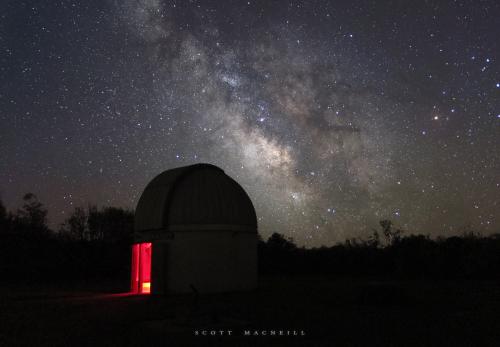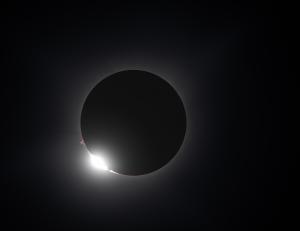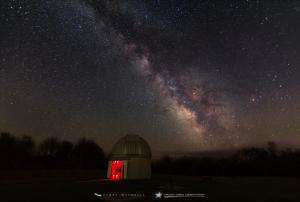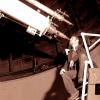Celebration of Space - April 12, 2024

The Milky Way galactic nucleus rises over Frosty Drew Observatory. Credit: Frosty Drew Astronomy Team member, Scott MacNeill.
Now that the fantastic total solar eclipse that occurred on Monday, April 8, 2024 has passed, the intense flood of images onto the web has commenced. Nearly everywhere you look online there are photos of the eclipse. At Frosty Drew, our Astronomy Team members captured gigabytes of data from the eclipse. Some of the data captured spans Texas, Ohio, New York, and Vermont. The majority of our team experienced a fabulous day, including a couple of our representatives that hung out at Frosty Drew Observatory for the day. Even though so many others are pushing out eclipse photos everywhere, we will offer a delayed, periodic release of our data sets. Both on social media as well as our website. We created a new gallery for the 2024 eclipse. Over the next month or two we will be progressively adding photos.
During the eclipse we hosted a live stream of the entire event, and all views of the Sun came from Frosty Drew Astronomy Team member, Sean Perkins, who was set up in St. Albans, VT. Unlike most of our team members, Sean drove up that morning and came home that night. His perseverance and dedication to bring the eclipse to those who did not have a view was astounding and quite successful. Frosty Drew Astronomy Team member, Scott MacNeill, offered a periodic commentary of the eclipse from Rochester, NY, where you were able to see the shadow of the eclipse move in and darken the landscape on the live stream. The entire live stream was recorded and has been archived here. The following chapters have been added, which are also available via the description under the live stream:
Sean introduces the start of the eclipse
Scott introduces the start of the eclipse
Partial eclipse commentary
Total Eclipse begins in Rochester, NY
Total Eclipse begins in St. Albans, VT
Bailey’s Beads and the Diamond Ring
Scott introduces outset of partial eclipse
Check out these notable moments in our live stream as a recap or for another view.
Next Saturday, April 20, 2024, Ninigret Park – home to Frosty Drew Observatory and Science Center, will be hosting its annual Earth Day celebration. The event will take place in the pavilion in Ninigret Park by the beach as well as in the soccer field across from the parking area. Frosty Drew will have our solar telescopes set up offering views of the Sun in different wavelengths. Depending on weather, we will also open the Science Center, and Observatory for tours and perhaps offer views of Venus in the big telescope. We’ll write about it again next Friday with updates.
Now that April is here, Milky Way viewing season is back, and at its best for Ninigret Park! At Frosty Drew we always capture our photos of the Milky Way during April because the timings are the best for a view. This is because the Milky Way will rise in the morning hours after midnight, but well before sunrise. During this time we will experience the least amount of local light pollution as well as the clearest part of the night. Convection during these hours is at a minimum, and usually all the moisture has fallen out of the air as dew. The Milky Way will be perfectly framed over the southern sky, which is the best place to observe it. Since the Moon is moving back into the early morning sky overnight tonight, now is probably the best time to catch a view. The presence of the Moon will certainly obscure the view of the Milky Way, and depending on how bright the Moon is, it could completely outshine it. If setting out for a view or a photo be respectful of everything in the Park and do not drive in with your high beam headlights on. In fact, driving with just your daytime driving lights is the right thing to do, and just take it slow. Otherwise, you may be met with smirks upon arriving. Even though April is the best time for a view, the Milky Way will be sticking around for the next six months as we kick off the viewing season. So make plans this year to see the Milky Way with your own eyes, and see why preserving the darkness in Ninigret Park is so important.
- Author:
- Scott MacNeill
- Entry Date:
- Apr 12, 2024
- Published Under:
- Scott MacNeill's Columns



